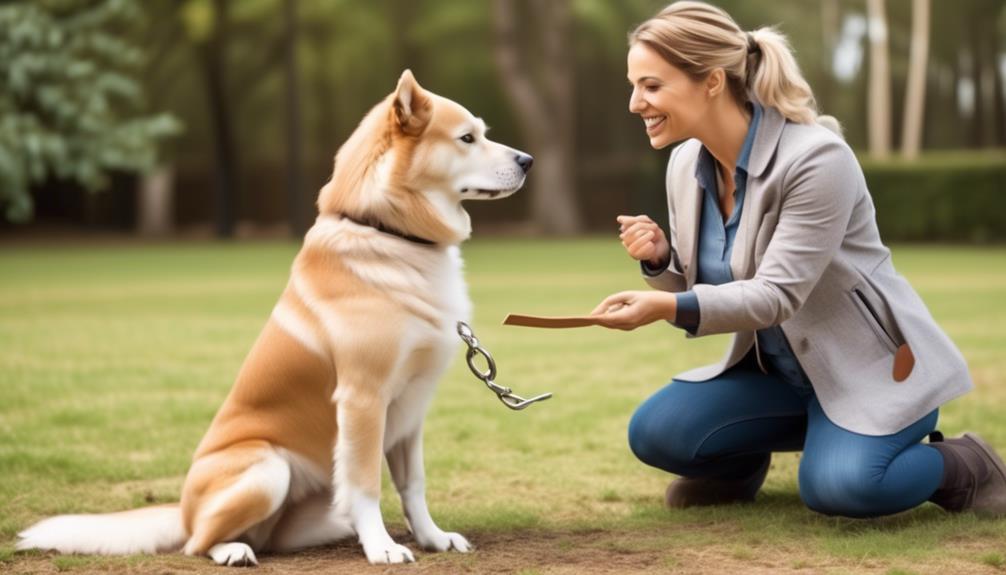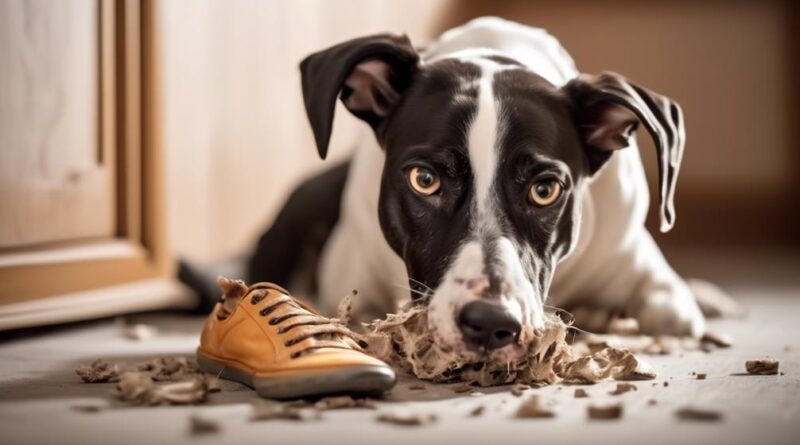11 Effective Tips to Curb Your Dog's Chewing Habits
You've come home to find your favorite pair of shoes chewed to bits by your furry friend. It's frustrating, but there are effective ways to tackle this common issue.
From understanding the root cause of your dog's chewing habits to providing appropriate chew toys and seeking professional help when necessary, there are several strategies that can help you address this behavior.
But there's one often overlooked tip that could make a significant difference in curbing your dog's chewing habits.
Understanding the Root Cause
To understand why your dog chews, observe their behavior and environment for clues to the root cause. Understanding your dog's behavior is crucial in addressing their chewing habits. Dogs may chew due to anxiety, boredom, teething, or a lack of proper training. By observing when and where your dog chews, you can start to pinpoint the underlying reasons for this behavior.
Training techniques play a significant role in addressing your dog's chewing habits. Positive reinforcement, such as providing chew toys and praising good behavior, can redirect your dog's chewing tendencies. Additionally, consistent training and setting boundaries can help modify your dog's behavior. Understanding the triggers that lead to chewing episodes allows you to implement targeted training techniques.
For example, if your dog chews when left alone, gradual desensitization to separation through short absences can help reduce their anxiety and subsequent chewing.
Providing Appropriate Chew Toys
When addressing your dog's chewing habits, it's important to ensure that you provide appropriate chew toys to redirect their behavior and satisfy their natural urge to chew. Choosing durable toys is essential to withstand your dog's chewing strength and prevent them from destroying the toy too quickly. Look for toys specifically designed for heavy chewers, such as rubber or nylon toys, to ensure they're long-lasting and safe for your dog to chew on.
Encouraging positive chewing habits involves offering a variety of chew toys to keep your dog engaged and entertained. Interactive toys like puzzle feeders or treat-dispensing toys not only satisfy your dog's chewing instincts but also provide mental stimulation. This can be particularly beneficial for high-energy breeds or dogs prone to boredom. Additionally, rotating between different types of chew toys helps prevent your dog from getting bored with a particular toy, reducing the likelihood of them turning to household items for entertainment.
It's important to supervise your dog, especially when introducing a new chew toy, to ensure they're using it safely. If you notice any signs of wear and tear, replace the toy promptly to prevent your dog from ingesting small pieces that could be harmful.
Supervising and Redirecting Behavior
Ensure close supervision and immediate redirection when you observe your dog engaging in inappropriate chewing behavior. Redirecting attention and using positive reinforcement are effective ways to address this issue. When you catch your dog chewing on something they shouldn't, calmly interrupt the behavior and replace the item with an appropriate chew toy. This teaches your dog what's acceptable to chew on and redirects their attention to the proper item.
Supervised playtime and interactive training can also help in curbing chewing habits. By engaging in activities with your dog, you can monitor their behavior closely and intervene if they start chewing on something they shouldn't. Interactive training, such as teaching your dog commands like 'leave it' or 'drop it,' can be incredibly useful in redirecting their behavior in the moment.
Additionally, it's important to create a safe and enriched environment for your dog. This includes removing any items that aren't meant for chewing and providing plenty of appropriate chew toys. Regularly rotating these toys can keep your dog engaged and less likely to seek out other items to chew on.
Establishing a Consistent Routine
As you guide your dog in redirecting their chewing behavior, establishing a consistent routine will further support their learning and development. Dogs thrive on routine, and by implementing a structured schedule, you can effectively curb their chewing habits.
Here are some effective tips for establishing a consistent routine:
- Establishing boundaries: Set clear boundaries for your dog's behavior, including designated chewing areas and toys. Consistency in these boundaries will help your dog understand what's acceptable to chew and what's off-limits.
- Positive reinforcement techniques: Use positive reinforcement, such as verbal praise, treats, or toys, to reward your dog when they chew on appropriate items. Consistently rewarding good behavior will encourage your dog to continue making the right choices.
- Regular exercise: Incorporate regular exercise into your dog's routine to help them release excess energy. A tired dog is less likely to engage in destructive chewing behaviors.
- Scheduled feeding times: Establish specific feeding times for your dog to regulate their digestive system and energy levels. A consistent feeding schedule can also help prevent boredom, which can lead to excessive chewing.
- Interactive playtime: Set aside time for interactive play with your dog to provide mental stimulation and bonding. Engaging in play activities can redirect your dog's focus from destructive chewing to positive interactions with you.
Using Bitter Sprays or Repellents
Consider using bitter sprays or repellents to deter your dog from chewing on inappropriate items. These products are designed to taste bad and discourage your dog from gnawing on things they shouldn't. When using bitter sprays or repellents, it's important to apply them consistently to the objects your dog is drawn to. This will help to create a negative association with those items, ultimately dissuading your dog from chewing on them. You can find these products at pet stores or online, and they're safe for most surfaces and non-toxic for your pet.
In addition to using bitter sprays or repellents, consider incorporating training techniques and behavioral modification to address your dog's chewing habits. Positive reinforcement is a powerful tool in training dogs, so be sure to praise and reward your pet when they chew on appropriate items. Redirecting your dog's attention to chew toys or bones can also help to steer them away from destructive chewing behaviors. If you find that your dog's chewing habits are particularly problematic, enrolling them in training classes can provide valuable guidance and support in addressing this issue.
Providing Sufficient Physical and Mental Exercise
To prevent excessive chewing, engaging your dog in regular physical and mental exercise is essential for their overall well-being and behavior. Ensuring your furry friend gets enough exercise will help reduce their urge to chew on items around the house.
Here are some effective ways to provide your dog with the necessary physical and mental stimulation:
- Interactive Play: Engage in activities such as fetch, tug-of-war, or hide-and-seek to keep your dog physically active and mentally stimulated. Interactive play helps channel their energy into positive outlets.
- Enrichment Activities: Use puzzle toys, treat-dispensing balls, or interactive feeders to provide mental stimulation for your dog. These activities encourage problem-solving and keep them entertained.
- Regular Walks and Runs: Take your dog for daily walks or runs to allow them to release pent-up energy. This not only helps with their physical health but also provides mental stimulation as they explore the environment.
- Training Sessions: Incorporate regular training sessions into your routine. Teaching new commands or tricks challenges your dog's mind and provides mental exercise.
- Social Interaction: Arrange playdates with other dogs or visit a dog park. Socializing with other canines can provide mental and emotional stimulation for your dog.
Seeking Professional Help When Necessary

When regular exercise and mental stimulation fail to curb your dog's chewing habits, seeking professional help from a certified dog behaviorist or trainer can provide tailored solutions for addressing this behavior. Professional training and behavioral therapy offer specialized interventions that can effectively address persistent chewing issues in your dog.
Professional trainers and behaviorists are equipped with the knowledge and experience to assess your dog's specific needs and create a customized plan to modify their chewing behavior. They have extensive expertise in understanding dog behavior and can employ various training techniques to redirect your dog's chewing tendencies. They can help you implement positive reinforcement strategies, such as providing appropriate chew toys and rewarding desirable chewing behavior.
Additionally, behaviorists can delve into the underlying reasons for your dog's excessive chewing, which may stem from anxiety, boredom, or other behavioral issues. By addressing the root cause of the behavior, behaviorists can develop targeted interventions to modify your dog's chewing habits effectively.
Behavioral therapy may also be recommended by professionals to address more complex chewing issues. This form of therapy involves a structured approach to modifying your dog's behavior through systematic desensitization and counterconditioning techniques. It focuses on reshaping your dog's response to triggers that lead to destructive chewing, ultimately replacing the behavior with more appropriate alternatives.
Being Patient and Persistent
If you notice your dog exhibiting chewing behaviors, it's important to be patient and persistent in addressing this habit. Here are some effective tips to help you manage your dog's chewing habits:
- Positive Reinforcement: Use positive reinforcement to encourage good behavior. When your dog chews on appropriate items like toys instead of furniture or shoes, praise and reward them. This will help your dog associate good behavior with positive outcomes.
- Consistent Training: Consistency is key when trying to curb your dog's chewing habits. Be persistent in redirecting your dog to appropriate chew toys and consistently reinforce the behavior you want to see.
- Provide Mental Stimulation: Sometimes, chewing can be a result of boredom or excess energy. Engage your dog in activities that provide mental stimulation, such as puzzle toys or interactive games, to help channel their energy in a positive way.
- Use Deterrents: Consider using taste deterrents on household items that your dog is prone to chewing. These products have a bitter taste that discourages chewing, helping to protect your belongings while your dog learns appropriate chewing behaviors.
- Seek Professional Help: If your dog's chewing habits persist despite your efforts, consider seeking help from a professional dog trainer or behaviorist. They can provide expert guidance and personalized behavioral training to address the underlying causes of your dog's chewing habits.
Frequently Asked Questions
Can Anxiety Medication Be Used to Help Curb My Dog's Chewing Habits?
Yes, anxiety medication can be used to help curb your dog's chewing habits, but it's important to also incorporate other methods such as using treats, toys, and behavioral therapy to address the root cause of the behavior.
What Are Some Alternative Methods for Redirecting My Dog's Chewing Behavior?
To redirect your dog's chewing behavior, try using chewing alternatives like durable toys or bones. Employ training methods such as positive reinforcement to teach appropriate chewing. Consistency and patience are key for effectively curbing this habit.
Are There Any Specific Breeds That Are More Prone to Destructive Chewing Habits?
Certain breeds have genetic tendencies for destructive chewing habits. However, with consistent training methods and behavior modification, you can effectively curb these inclinations. Understanding your dog's breed tendencies can aid in developing a successful training approach.
How Can I Prevent My Dog From Chewing on Furniture and Household Items When I'm Not Home?
When you're not home, dog proofing your space and crate training can help prevent your dog from chewing on furniture and household items. Use bitter-tasting sprays on furniture and provide appropriate chew toys.
Are There Any Specific Training Techniques That Can Be Used to Address Chewing Behavior in Older Dogs?
To address chewing behavior in older dogs, try positive reinforcement and behavior modification techniques. Reward your dog for appropriate chewing with toys and discourage unwanted chewing by redirecting their attention and providing appropriate outlets for chewing.
Conclusion
Now that you have these 11 effective tips to curb your dog's chewing habits, you can start implementing them to help your furry friend break the habit.
Remember to be patient and consistent, provide appropriate chew toys, and seek professional help if needed.
With time and effort, you can help your dog develop healthier chewing habits and create a happier and more harmonious living environment for both of you.
Good luck!
